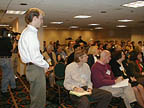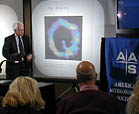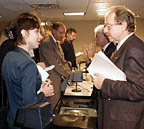An overview of the Chandra mission and goals, Chandra's namesake, top 10 facts.
Classroom activities, printable materials, interactive games & more.
Overview of X-ray Astronomy and X-ray sources: black holes to galaxy clusters.
All Chandra images released to the public listed by date & by category
Current Chandra press releases, status reports, interviews & biographies.
A collection of multimedia, illustrations & animations, a glossary, FAQ & more.
A collection of illustrations, animations and video.
Chandra discoveries in an audio/video format.
Black Holes, Buzz, Breakfast, & Burbidge
February 22, 2000 ::
 Audience at the AAS Audience at the AAS
|
Meetings of the American Astronomical Society are a time for astronomers and astrophysicists to exchange information about what's new and what's the
buzz. This is done formally in talks and poster sessions, and informally over a cup of coffee, a glass of wine, or a meal.
In the January Atlanta meeting, the buzz was definitely about Chandra - 47 papers, 6 press releases, two press conferences, and numerous television interviews. Much of the buzz revolved around
discoveries related to black holes.
 Claude Canizares
presenting at the AAS Claude Canizares
presenting at the AAS
|
That in itself was not surprising. After all, one of the main justifications for building Chandra was to observe X-ray sources associated with black holes.
What was surprising was the diversity of new results on black holes: the detection of an unusually faint black hole in the
center of our galaxy; an
unusually cool black hole in the
Andromeda Galaxy; the unusual number of intense giant black hole sources in quasars and active galaxies, some of which may
be older than the oldest stars - a giant buzz on
this one; and the spectacular X-ray jets produced by black holes.
 Geoffrey Burbidge Geoffrey Burbidge
|
All this was on Geoffrey Burbidge's mind when we joined him for breakfast one morning. Geoff, a professor at the University of California, San Diego, was recently honored by the Astronomical Society
of the Pacific for a lifetime of achievement in astronomy. This includes a famous 1957 paper with Fred Hoyle, William Fowler and his wife Margaret which laid the foundation for all subsequent work on
the origin of the elements. He is also known for his work on cosmic radio sources, the structure of galaxies, active galactic nuclei and quasars, and cosmology. It is in the latter two areas that he
has cast himself in the role of a cosmic gadfly. It is a role he clearly enjoys, although he frequently complains about the difficulty of constantly flying in the face of the prevailing winds of
orthodoxy.
 Steve Murray presenting at the
AAS Steve Murray presenting at the
AAS
|
"I remain skeptical about these supermassive black holes," he said. "I have no problem with the binary black holes (black holes with masses about ten times that of the Sun that are in close orbits around another star), but these giant ones - I don't know. I think it's a different process."
What process?
 Chandra Press
Conference at the AAS Chandra Press
Conference at the AAS
|
"I can't put my finger on it, but neither can anyone else. We don't know how they are made in the first place and they don't behave the way everyone thought a black hole should behave. We see matter flowing away from them at near the speed of light! Is that what you expect from a black hole? The new observations just confound things further. They invoke advection, convection, perfection, to explain them. It all seems very peculiar to me." He paused to polish off a plate full of scrambled eggs, then continued.
"I don't know the answer," he said. "Maybe there's a repulsive force that comes into play at very short distances. All I ask is that people keep an open mind in the face of the data, and not jump on a bandwagon just because its going down the street."
 V. Trimble presenting at
the AAS V. Trimble presenting at
the AAS
|
Talk then shifted to the whereabouts and activities of mutual friends, the publication of his book with Hoyle and Jayant Narlikar, named (what else?) A Different Approach to Cosmology, and the
difficulties of getting around in the Atlanta airport. Breakfast ended, and Geoff went off to attend more talks on black holes and such, where he sat on the front row, asked challenging questions,
and urged the speakers to keep an open mind.










